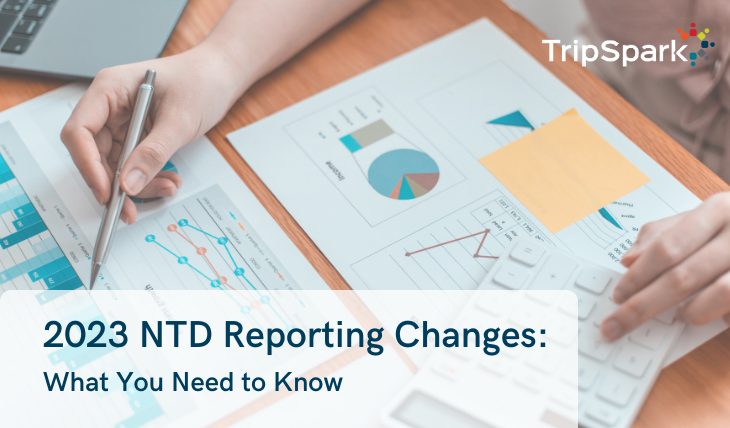2023 NTD Reporting Changes: What You Need to Know

Back in July 2022, the Federal Transit Administration (FTA) released intended updates for National Transit Database (NTD) reporting requirements. The final notice of changes was published in March 2023 and included clarifications and modifications to some of the biggest updates. Most of the changes are immediate or imminent, so let’s give you a quick and easy summary of what you need to know.
We’ll look at the top three new requirements and how to make sure you’re meeting them:
1. New Sample-Based Monthly Data (WE-20)
2. General Transit Feed Specification (GTFS)
3. Collecting Geospatial Data for Demand Response Modes
WE-20: New Sample-Based Monthly Data
With WE-20 coming into effect, agencies will need to provide a random sample report of weekly unlinked passenger trips (UPT) and vehicle revenue miles (VRM) for selected modes. While some commenters on the original proposal expressed concern about this posing a particular administrative burden for small, rural or Tribal agencies, we’re glad to tell you that TripSpark’s Streets and Novus solutions, PASS and Routematch all easily accommodate the WE-20 requirement for you! And, of course, our team is ready to assist you—simply submit a Customer Care ticket, and we’ll help you make sure you comply with the requirements.
Importantly, WE-20 affects vanpool providers differently than other modes because of the nature of the service model and how (in)frequently volunteer members submit their reports. As a result, the NTD is allowing vanpool providers to report Vehicles Operating at Maximum Service (VOMS) instead of UPT or VRM. RidePro by TripSpark already collects and reports UPT, VRM, and VOMS, so the only remaining need is to meet the tight turnaround time required by the NTD if you’re requested to provide a report.
On the agency side, timely reporting by volunteer members is a business process challenge that agencies can deal with by choosing to incentivize early reporting, for example. When it comes to RidePro, if your vanpool program is selected by the NTD, please contact our Customer Care team to support your report efforts. With our collaboration, the final result will be much easier.
General Transit Feed Specification (GTFS)
The next important NTD requirement is the General Transit Feed Specification (GTFS). This update requires transit agencies to create and maintain a public-domain GTFS dataset. Agencies using outdated software are likely to struggle with this requirement, and comments on the original proposal suggested that staff at smaller agencies may be constrained in terms of staff availability and technical expertise to build a GTFS feed.
However, we’re glad to tell our customers of all sizes that anyone using Streets and Routematch Fixed will be taken care of with compliance support.
Another of the main concerns commenters had about this requirement was posting a publicly available link on the web to an agency’s GTFS dataset. Based on our analysis, this is unlikely to pose a risk, which is great news!
Collecting Geospatial Data for Demand Response Modes
The final new requirement to concentrate on is that Demand Response modes must now report geospatial data through a new NTD form. The good news is that your agency staff will likely be able to answer all of the proposed questions with limited need for software support which makes this important requirement more straightforward for you. Of course, when in doubt, you can always reach out to your TripSpark team for assistance!
Answers to Your Questions about the 2023 NTD Report Changes
Questions about how to meet the new NTD requirements at your agency? We’d be happy to help. Contact us, or if you’re an existing customer, please contact Customer Care for a quick and personalized response.

